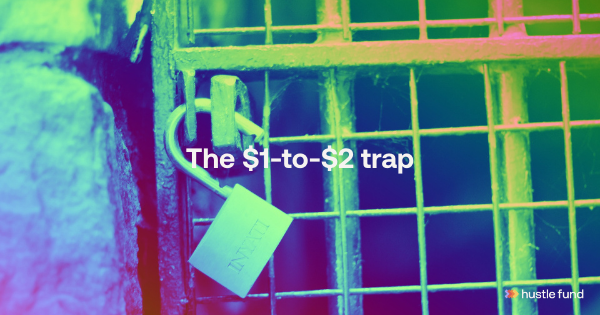Warehousing deals to attract LPs
.png)
Brian Nichols is the co-founder of Angel Squad, a community where you’ll learn how to angel invest and get a chance to invest as little as $1k into Hustle Fund's top performing early-stage startups
Over the last few weeks, I've written a handful of articles on the inner workings of setting up a venture fund.
I've covered the tortuous grind of back-office ops, the challenges of raising Fund II as compared to Fund I, and the realities of what LPs look for when they hear a VC pitch.
Today I wanna continue down this road, but on a different topic: how to set up your fund in a way that attracts new LPs.
This is a big topic, so I'm breaking it down into three parts. Over the next few weeks, we'll cover:
- warehousing
- recycling management fees
- co-investing
This week we'll dive into the first of those topics: warehousing. Let's get started.
(Oh, and if getting more LPs is something you're interested in, you're gonna love our upcoming event, "Get More LPs", happening virtually on August 9.)
First, what is warehousing?
Warehousing is when a VC takes a deal they made as an angel investor, and transfers ownership to their fund. Let me explain.
When a VC is just starting out, it can be hard to get attention from LPs. Especially now that there is so much competition in the venture capital space.
In 2017, when Hustle Fund was a brand new fund, co-founders Eric Bahn and Elizabeth Yin were running into this problem. But they had one thing going for them: their track records as angel investors.
Prior to starting the fund. Eric and Elizabeth had collectively invested into a handful of unicorns, like Webflow, Nerdwallet, Boom Supersonic, etc.
But while Eric and Elizabeth's personal portfolios showed their skills in selecting great companies, those portfolios weren't actually helping them close LPs. So they decided to warehouse their best deals.
For example, Eric was an early investor in a company we'll call HippoCamp. He invested in the company around 2012, and by 2017 – when he and Elizabeth were raising their first fund – the company was well on its way to becoming a unicorn.
Eric decided to warehouse this deal... meaning he sold his shares in HippoCamp to Hustle Fund at the same price he paid for the shares 5 years before.
In 2017, Eric's HippoCamp shares were worth far more than what he paid for them back in 2012. But he didn't charge the fund their 2017 price. He sold them at cost.
In doing so, he transferred ownership of the shares from himself to Hustle Fund.
Why would they do this?
On paper, this is an outrageous move.
Think about it: if Eric had kept his HippoCamp shares in his personal portfolio, those shares could have brought in considerable personal wealth for himself and his family.
FWIW, "HippoCamp" is worth billions of dollars today.
Instead, Eric personally earned back the exact amount he invested in 2012. There was no personal gain there at all.
He, Elizabeth, and their future co-founder Shiyan Koh did this with many, many other deals. In doing so, the GPs (general partners) of Hustle Fund guaranteed fund returns to their earliest LPs.
And it worked. Eric, Elizabeth, and Shiyan raised $11.5 million in 2018, thanks in large part to this warehousing strategy.
They needed CEO approval
Now, in order to transfer ownership of their shares to the fund, the Hustle Fund GPs needed something critical: CEO approval.
See, shareholders in privately-held companies can't just sell their shares willy nilly.
They can line up a buyer, sure. But they need CEO approval and quite a bit of legal paperwork to complete the transfer.
And getting CEO approval of this transfer requires a lot of relationship capital. Think about it – if a shareholder approaches a CEO and says: "Hey, I want to sell my shares at a crazy discount to a different investor," the CEO has a right to to purchase the shares themselves at that same price.
So the CEO of HippoCamp could easily have said to Eric: "I don't approve this sale, and instead I want to buy your shares back." This is the CEO's legal right, and from a business perspective it's the smart move.
But the CEOs that Eric, Elizabeth, and Shiyan approached didn't say that. They all approved the transfers.
Why would a CEO approve this?
This was my biggest question. Why would a CEO knowingly forfeit the opportunity to buy back ownership of their company at a massive discount?
The answer is deceptively simple. These CEOs did it as a personal favor to their angel investors. Put simply, they liked Eric, Elizabeth, and Shiyan.
And because of that, the CEOs opted to do a solid for the Hustle Fund co-founders rather than strive for personal gain.
So, how did the Hustle Fund GPs develop such solid relationships with the founders they invested in? For Eric, it comes down to these three elements:
- Be kind
- Be consistently helpful
- Be vulnerable
When you nail number 1 and 2 on that list, you develop a strong relationship with your portfolio founder. And when you have that strong relationship, it's a lot easier to say to that founder: "I am so excited about this fund I'm starting, and it would be a huge favor to me if you would help me out in this way.
Not every founder will say yes. Some founders will ask to buy the shares themselves... and if they do, you're not required to give them up. Rather, you would simply hold on to the shares in your personal portfolio and hopefully see a big return for yourself when the company exits.
Leveraging your warehoused deals
Warehousing your best deals is a super effective way to attract LPs. It may be at a personal cost, but the long-term benefits to your fund are massive.
The key to this strategy is building a strong portfolio as an angel investor, and cultivating a healthy relationship with your founders.













